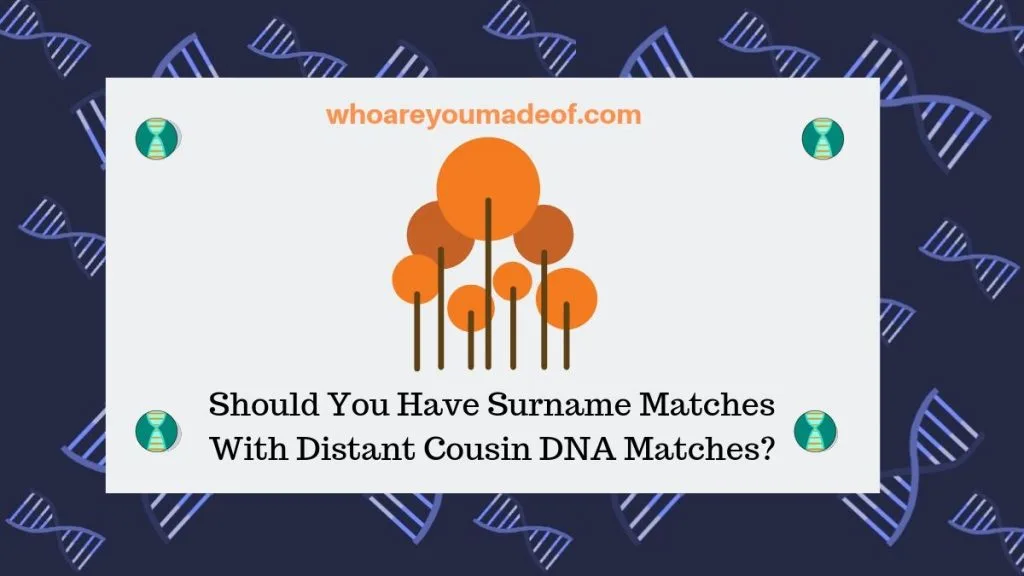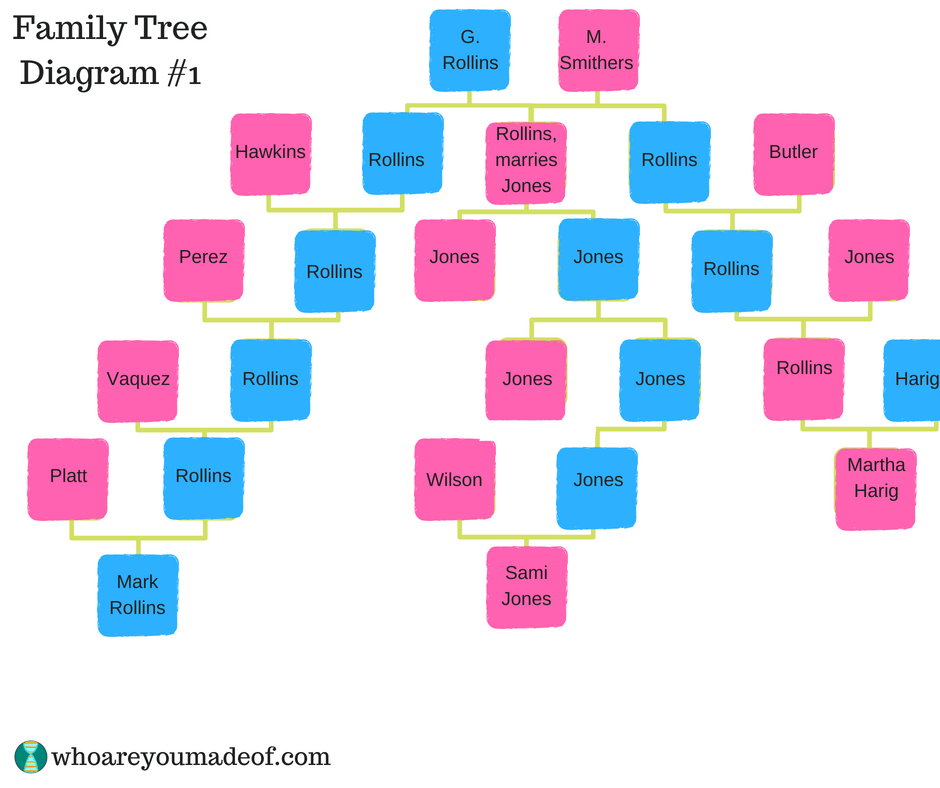If you have been spending a good bit of time working with your DNA matches, you might be asking a very common question. Should you have surname matches with distant cousins?
Is it normal to scroll through your DNA match list and find no one who shares your surname or maiden name? Does not seeing your surname among your matches mean that there is a mistake in your family tree?

In this post, I'll address these questions - and more.
As it turns out, it's completely normal to not find very many surname matches among your distant cousin DNA matches. There are several reasons behind this, and I'll give you more explanation in detail below.
Only direct descendants of the male ancestor who shares your last name will share surnames with you
In the US and in most other countries, surnames are passed down from a father to his children, but only those male children will pass down their father's surname to their children. If the father only has female children, then the surname does not continue on his line.
If he has two sons and a daughter, like in the diagram below, only the sons will carry the surname. The daughter will take her husband's name, and her children, the grandchildren of her father, will not share his surname.
All of the people descended from the same common ancestor are related to each other, whether or not they share a surname. In order to illustrate this to you, just so you can visualize how quickly a surname can disappear in a family, I made the chart below.
The grandparents, G. Rollins and M. Smithers are the most recent common ancestors of everyone else listed in the tree (except for spouses of the descendants).
Males are in blue, and females are in pink - and you can see that when a pink descendant has a union with a blue person, they take on that person's surname. At the bottom of the graphic, Mark Rollins and Sami Jones are on the same generation.
Mark and Sami are fourth cousins, yet do not share a surname. Martha Harig, who is one generation closer to the set of common ancestors, does not share the Rollins surname - even though she is more closely related to G. Rollins and M. Smithers. This is because her Rollins mother married a Harig, and the Rollins name didn't get passed down.

The result of this pattern of surname inheritance means that you need to be on the lookout for multiple surnames in your family tree. The more you know about your ancestors - all of their children, even the ones that you aren't directly descended from, also known as collateral ancestors - the more you will know about the surnames that you should be looking for among your DNA matches.
You'll easily spot which lines of your family were the most prolific, since their descendants will pop up again and again on your match list.
Whether or not your relatives have taken a DNA test is a game of change - or not
My dad's father is the son of children of Dutch and German immigrants. When I first did my autosomal DNA test, I didn't see anyone with my Dutch maiden name on my match list. I uploaded my DNA to other sites, and still I found nothing.
I have since learned that the Netherlands and the Dutch people are excellent record keepers, and most people know everything about their family many generations back, so many Dutch people don't see a need for doing a DNA test to learn about their family tree. In other words, they already know about their family tree!
To some, even here in the US, it might even be viewed as insulting to imply that there is something to be learned through DNA testing. So in some families (or countries, as in my case) it might be less likely that people will take a DNA test for genealogy.
And if your relatives don't take a DNA test, then you won't find their names on your DNA match list. It doesn't mean that you aren't related to them, or that there is something untoward in your family history. It means only that they haven't tested - nothing more, nothing less.
For inquiring minds interested about my Dutch genealogy search, I was able to get my great-uncle to take a DNA test for me, and since his DNA is "more Dutch" than mine, we were able to cast a wider net and find more Dutch cousins - including some with my Dutch surname. Phew.
Maybe you don't share a surname with your match because your common ancestor didn't have a surname
The concept of surnames is a relatively new one in the western world, though surnames have been in use in China since the 2nd century BC. Since people in the United States generally follow English-style naming customs, it is relevant to know that the concept of a surname spread gradually throughout Europe and became widespread in Britain towards the end of the Middle Ages.
By the 1500's, most people were using surnames in Britain.
In some countries, the idea of a family name or a surname is more recent. This is important to know because of the nature of autosomal DNA tests.
These tests can access information from your DNA that can tell you about your family history as long ago as about 500 years - sometimes a little further, and other times not quite as far. But what this means is that it is possible to have a DNA match with someone with a common ancestor so far back that it was before surnames were even used in your ancestor's country of origin.
This is a really interesting concept, and of course, difficult to provide evidence for - record keeping was low on the list of priorities for the average family 500 years ago.
So, even though maybe you and your DNA match are both descended through direct male lineages to your common ancestor, it's possible that the surname got changed along the way on either line, or that your common ancestor didn't have a surname. Perhaps a surname got added at some point shortly after, but the descendants ended up using a different one.
Note: This situation is uncommon, and would only be possible between two cousins who share very, very small amounts of DNA - less than 10 centimorgans (cMs)
Conclusion
There are many more reasons that your distant cousins won't share your surname, or won't even have a recognizable surname, and I discussed just a few of them in this post. I hope you were able to get a good understanding of what to look for in your matches.
If you have something to add, that's great! I hope to hear from you in the discussion below.
Thanks for stopping by!
